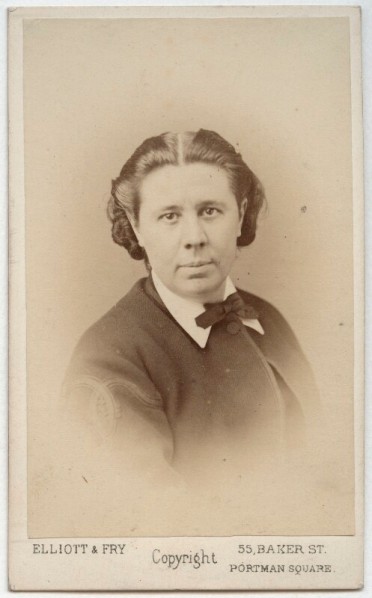Turbulent Londoners is a series of posts about radical individuals in London’s history who contributed to the city’s contentious past, with a particular focus of women, whose contribution to history is often overlooked. My definition of ‘Londoner’ is quite loose, anyone who has played a role in protest in the city can be included. Any suggestions for future Turbulent Londoners posts are very welcome. Next up is Emily Faithfull, a women’s rights activist and publisher

Many discussions about women’s rights in the second half of the nineteenth century focus on the campaign for the right to vote. However, there were other parallel campaigns related to women’s legal and employment rights. Emily Faithfull was a publisher and activist who supported the suffrage campaign, but was more concerned with fighting for gender equality in the world of work.
Emily Faithfull was born on 27 May 1835 in Surrey. She was the youngest of 8 children, and her father was a reverend. Her family were clearly relatively high status, as she was presented at court in 1857, a ceremony associated with turning 18 that was reserved for elites and those with royal connections.
Emily joined the Langham Place Circle, a group of prominent women who advocated for legal, educational, and employment reform for women. Other members included Barbara Leigh Smith Bodichon, Emily Davies, and Bessie Rayner Parks. The group founded the Society for Promoting the Employment of Women (or SPEW, although not to be confused with Hermione Granger’s Society for the Protect of Elfish Welfare in the Harry Potter series); Emily Faithfull was Secretary.
In 1860, Emily founded an all-female publishers with the goal of expanding employment opportunities for women. The Victoria Press quickly gained a good reputation, and the following year was appointed printer and publisher in ordinary to Queen Victoria. Emily’s actions greatly upset the London Printer’s Union, who argued that women weren’t strong or intelligent enough for typesetting work. Between 1860 and 1866, the Press published the English Woman’s Journal, a feminist monthly periodical discussing women’s employment and other equality issues. From 1863 until 1881, the press published the monthly Victoria Magazine, which also advocated for women’s employment. Emily was a prolific journalist as well as a publisher; she wrote for the Victoria Magazine, the Lady’s Pictorial and the Pall Mall Gazette.
In January 1864, Emily published the first annual report of the Ladies London Emancipation Society. The Victoria Press would go on to publish more material for this group. 1864 was a difficult year for Emily, however. She was implicated in the scandalous and very public divorce of Admiral Henry Codrington and Helen Jane Smith Codrington. The exact role Emily played was never revealed, but the gossip was damaging enough. Her reputation suffered, and she was shunned by the Langham Place Circle.
Emily’s social isolation didn’t stop her campaigning, however. In 1868, she published a novel, Change Upon Change, a tragic romance that emphasised the need for women’s education. She was also a successful lecturer, giving talks to further the interests of women. This included two tours of America, in 1872 and 1882. In 1875, she joined the Women’s Trade Union League.
Emily moved to Manchester in her later years, and died on 31st May 1895. Throughout her life, she used speech, print, and her own business to argue that women deserved, and were capable of, a much wider range of employment than was accessible to them at the time. She deserves to be remembered as one of the pioneers of British feminism.
Sources and Further Reading
Simkin, John. “Emily Faithfull.” Last modified January 2015, accessed 3rd April 2019. Available at https://spartacus-educational.com/Wfaithfull.htm
Wikipedia, “Emily Faithfull.” Last modified 7th January 2019, accessed 3rd April 2019. Available at https://en.wikipedia.org/wiki/Emily_Faithfull